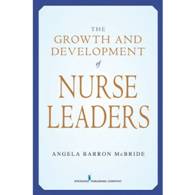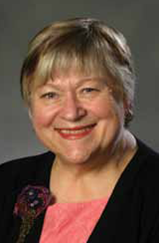 Happy President’s Day--a day in which we all should take a few minutes to appreciate the contributions of our nation’s leaders.
Happy President’s Day--a day in which we all should take a few minutes to appreciate the contributions of our nation’s leaders.
Here at the Hartford Foundation, we also routinely take stock of the accomplishments of our grantees--national leaders in the fields of nursing, social work, and medicine--and celebrate their efforts to improve the health care of our country’s older adults.
Recognizing this theme of leadership, I think it appropriate to now share a review of a new book, The Growth and Development of Nurse Leaders, by nursing champion Angela Barron McBride, PhD, RN, Distinguished Professor-University Dean Emerita at Indiana University School of Nursing.
 In it, with sharp wit and serious wisdom, McBride uses anecdotal and empirical evidence to dissect the key elements of leadership, and in so doing arrives at a successful recipe for professional development. McBride’s writing is rich with humor, honesty, and humility-fueled personal experience mixed with lessons learned and insights from leaders in the field. For years, I have watched McBride masterfully facilitate the annual Leadership Conference for our Building Academic Geriatric Nursing Capacity pre-doctoral and post-doctoral geriatric nurses. I can hear her voice on the pages.
In it, with sharp wit and serious wisdom, McBride uses anecdotal and empirical evidence to dissect the key elements of leadership, and in so doing arrives at a successful recipe for professional development. McBride’s writing is rich with humor, honesty, and humility-fueled personal experience mixed with lessons learned and insights from leaders in the field. For years, I have watched McBride masterfully facilitate the annual Leadership Conference for our Building Academic Geriatric Nursing Capacity pre-doctoral and post-doctoral geriatric nurses. I can hear her voice on the pages.
The book is wisely organized into three sections: Leadership as Personal, Leadership as Achieving Organizational Goals, and Leadership as Transformational. And although the book focuses on nurses, many of the leadership lessons shared are generalizable; they are not exclusive to one discipline. They are lessons that transcend nursing and empower all of us in health care to engage in some professional introspection and action. McBride covers the gamut of leadership stages/opportunities in one’s career from mentoring, to understanding one’s resource base, to interdisciplinary collaboration.
My copy has more than 30 flags marking noteworthy statements. And while one might almost open the book at random to find useful insights, here is a sampling of some of the gems I found especially telling and inspiring:
- On Pretending Can Be a Leadership Strategy
“Never hesitate to ‘pretend’ to be a leader…When you are new in a leadership role, you may not feel comfortable at the start, acting from your own authority, yet you know enough to have a sense of what that mythical creature “the good leader” would do in that situation.” (pgs. 14-15) - On Taking Care of Yourself
“We would do well to remember that airline instructions caution you, in case of a drop in pressure, to place the oxygen mask over your face before attending to the needs of others, because if you’re in distress you’ll be less effective in helping anyone else.” (pg. 41)
On Evolving Job Descriptions
“Nurses at all organizational levels need to act as if their contributions…are critical to the larger organization’s success.” (pg. 101)
On A Shared Responsibility
“The more you can articulate the added value you provide, the more you have avoided having anyone else dismiss you as merely a cost and not a benefit.” (pg. 136)
McBride’s book could not be more timely, given the context of health care reform and the recent Institute of Medicine Future of Nursing report, which calls for “Nurses to be full partners, with physicians and other health professions, in redesigning health care in the United States.”
We at Hartford, of course, are most invested in seeing geriatric nurses assume positions of influence to ensure that the health care needs of older Americans are placed front and center in health care reform discussions. Full disclosure: McBride dedicated a few pages in her book to the Hartford Geriatric Nursing Initiative, which she describes as “transformative.”
In honor of President’s Day and pioneering leaders, we tip our hat to Dr. Angela McBride and celebrate the implicit charge put forth in her book for nurses--and all health care professionals--to purposely assess our seat at the leadership table: If you are there, how well are you doing? If not, why not? Engaging in this self-reflection increases our collective potential to improve the health care of our nation.
